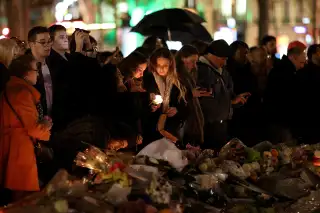The Real Reason Stocks Are Up After the Paris Terror Attacks

In the first trading week after the 9/11 terrorist attacks in 2001, the S&P 500 index sank more than 7% amid heightened security and economic fears. One week after the Madrid train bombings in March 2004, Spain's stock market was down more than 3%.
Yet in the first few trading days after the terror attacks in Paris, European stocks in general—and French shares specifically—are up about 3%.
Is this a case of financial patriotism or a reaction to France's political and military response?
More likely, it's a sign of investor faith that central banks will do everything in their power to prevent a recession in the immediate aftermath of a terrorist attack.
Just days after 9/11, for instance, the Federal Reserve swiftly moved to cut short-term borrowing rates from 3.5% to 3%. As it turned out, the U.S. economy was already in recession at the time, but policymakers did not know that. So the Fed kept cutting rates aggressively for the next 12 months, which may have helped the U.S. exit its recession by the end of 2001.
Similarly, less than a month after the July 7, 2005, terrorist bombings in London, the Bank of England cut short-term rates to promote growth.
Fast forward to the present, and the expectation is that the European Central Bank is now assured of cutting interest rates when policy makers are next scheduled to meet.
"The terrorist attacks are generally seen as increasing the already strong likelihood that the ECB will deliver more stimulus at its December 3 policy meeting," says Howard Archer, chief European and UK economist at I.H.S. Global Insight.
Indeed, economist Nouriel Roubini, who famously predicted the global financial crisis, told CNBC that the Paris attack could indirectly boost Europe's flagging economy if it gets the ECB to act more aggressively than planned.
Right now, "it’s too soon to conclude that this latest terrorist strike in Europe will have any significant impact on the region’s economy, which has been growing at a snail’s pace in any case," says Ed Yardeni, president and chief investment strategist at Yardeni Research.
He points out that similar attacks in the past "didn’t have any significant economic or financial consequences, though this one may be different for lots of obvious reasons."
Indeed, when London was attacked in 2005, the UK economy was in decent shape.
France's economy, on the other hand, is barely growing. In fact, in the second and third quarters of this year, gross domestic product in France was essentially flat. If France were to slip into a recession, Europe would slow even further, potentially leading to more handwringing over the slowing global economy. Aggressive moves by the ECB would go a long way toward easing those fears.
Soon, attention will turn to the Fed to see if the U.S. central bank will hold off raising rates in December to avoid muting the impact of an ECB rate cut. Right now, most market watchers think the Fed is still likely to raise rates in December, given recent economic data. And at least one Fed official, Richmond Fed president Jeffrey Lacker, is on record saying that the Paris attacks would not necessarily change the views of the Federal Open Market Committee.
But you never know. As Chris Rupkey, chief financial economist at Bank of Tokyo Mitsubishi, told CNBC: If Europe's response is a full-scale military move into Syria to go after ISIS, that "could give the Fed pause, especially if that uncertainty causes a pullback on the part of business and the consumer."